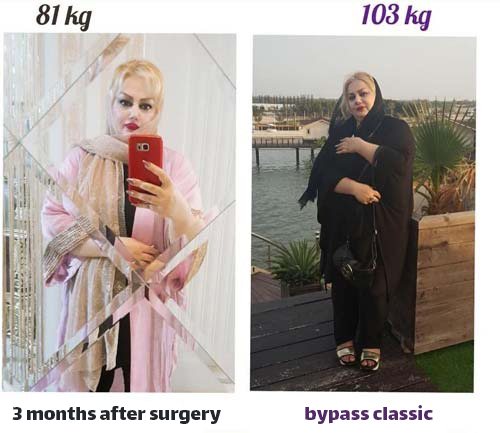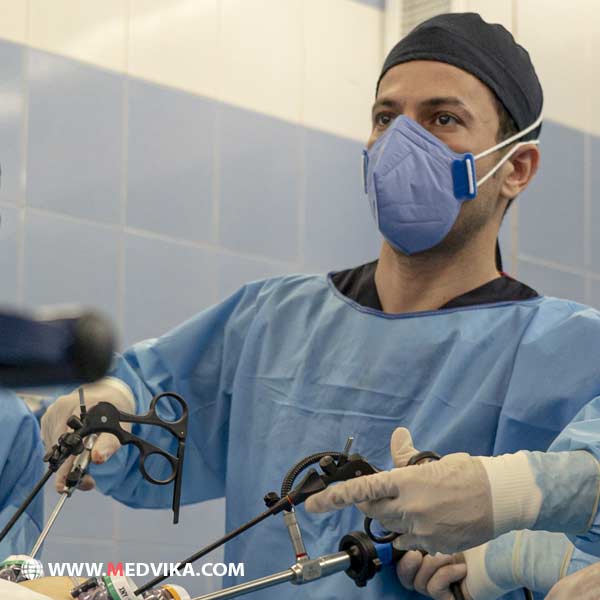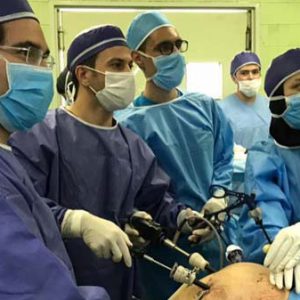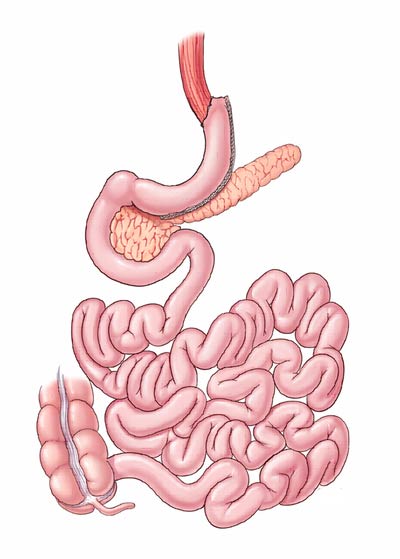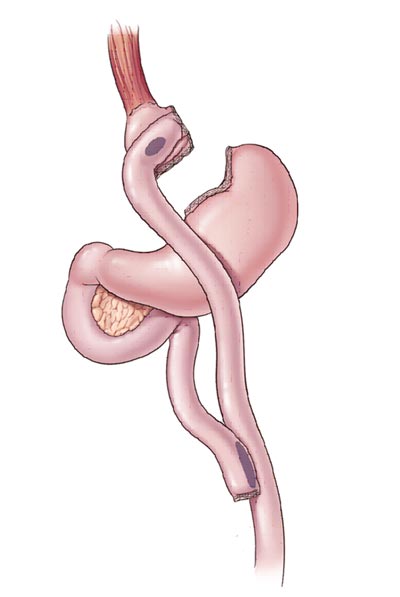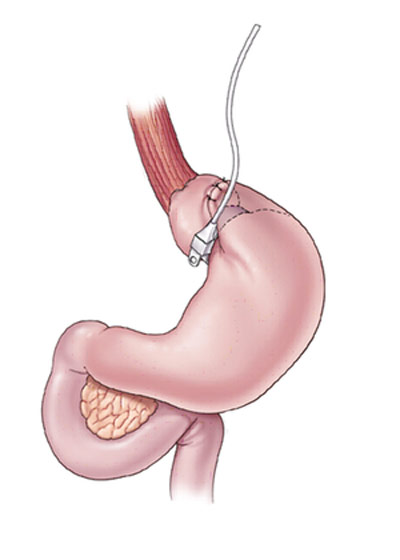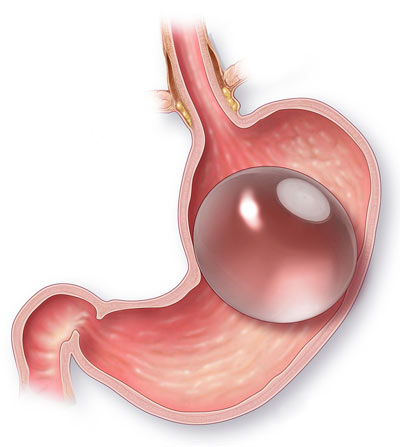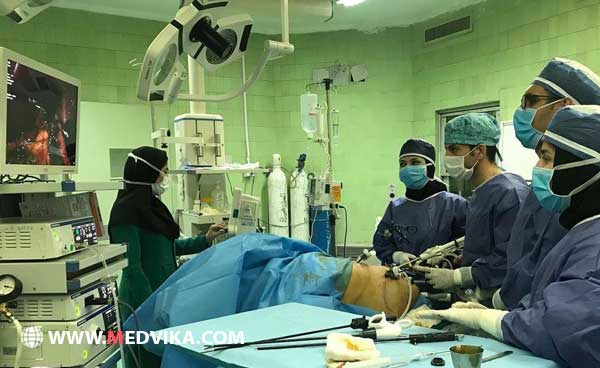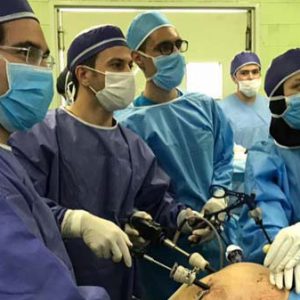
Gastric surgery in Iran (slimming surgery) with the best gastric surgeon
1439 ViewsGastric surgery in Iran, which is also called bariatric surgery or slimming surgery, is performed by a professional gastric surgeon. The goal of gastric surgery is to limit the amount of nutrients that the stomach can hold. By reducing the amount of food in stomach and thus reducing its absorption, the body loses weight.
Today, most weight loss surgeries are performed by using minimally invasive techniques (laparoscopic surgery). The most common methods of bariatric surgery include gastric bypass, sleeve gastrectomy, gastric balloon, and adjustable gastric band. You should know that each surgical method has its own advantages and disadvantages.
Here is more information about the types of gastric surgery for weight loss and everything you need to know about gastric surgery in Iran with the best gastric surgeon; Stay with us.
Who is the best gastric surgeon in Iran?
People who decide to have gastric bypass surgery are looking for a good gastric doctor in Iran. First of all, you should know that in order to perform gastric bypass surgery, you should refer to a specialist in gastric surgery in Iran.
The gastric surgeon must be master in all the methods of stomach reduction in order to be able to choose the best method based on the patient’s physical and mental condition. Also be skilled in performing new gastric surgery procedures through laparoscopy.
Dr. Hamed Gol Mohammadzadeh; Advanced Laparoscopic Surgery and Obesity Surgery Fellowship
Dr. Golmohammadzadeh, General Surgeon, holds a fellowship in Advanced Laparoscopic Surgery and Obesity Surgery and is a member of the International Association for Obesity Surgery (IFSO).He has a history of faculty and assistant professor at Mashhad University of Medical Sciences .Dr. Golmohammadzadeh is currently a member of the medical staff of Mashhad University of Medical Sciences and Ghaem Hospital. He is also the director of the surgical emergency department of Ghaem Hospital from 2014 until today.
What is a gastric surgery for weight loss?
Perhaps the question for many people is how does gastric surgery cause weight loss? Shrinking the stomach is one of the fastest ways to lose weight. Gastric surgery helps you lose weight and reduces the risk of obesity-related medical problems. Obesity surgery can help you lose weight in two main ways.
Limiting the stomach to receive food:
Surgery is used to reduce the amount of food that the stomach can hold, and this will limit your calorie intake.
Absorption limiter (Malabsorption):
Surgery is used to shorten the absorption or bypass part of the small intestine, which reduces the body’s absorption of calories and nutrients.
How is the gastric surgery in Iran?
For people with high body mass index, the only way to achieve weight loss is gastric bypass surgery. Usually all gastric bypass surgery is performed under general anesthesia using laparoscopic surgery. Of course, the procedure is slightly different for each type of gastric surgery.
In the following, we will talk about types of gastric surgery procedures in Iran and the advantages and disadvantages of each.
How much does a gastric surgery cost in Iran?
It depends on the technique and method used. You should also consider your doctor’s salary, hospital costs, and hospitalization. But in general, the cost of gastric surgery in Iran is about 2700$, which after the examination and consultation with doctor and determining type of surgery, the final price will tell to the patient by surgeon.
How many hours does a gastric surgery take?
Duration of gastric bypass surgery depends on the type and method of surgery.
Gastric sleeve surgery may take less than an hour,
but other methods, such as gastric bypass surgery, may take more than two hours.
Classic bypass surgery for a patient with a BMI of 48
Types of gastric surgery for weight loss (the latest method of weight loss surgery)
Today, the newest method of slimming surgery is the same as laparoscopic method, which, unlike open surgeries, has a shorter recovery period and the sutures from slimming surgery are much smaller. Gastric surgeons typically use several methods for slimming surgery that the most common slimming methods with gastric surgery include gastric sleeve, gastric bypass, adjustable gastric ring and gastric bypass.
1- Stomach sleeve operation
Gastric sleeve surgery is one of the fastest weight loss methods based on dietary restrictions. This operation is one of the most common restrictive surgeries. In this method, about 80% of the stomach volume is removed and only 20% of the stomach remains as a banana-shaped tube. Of course, this method is not possible for everyone.
Gastric sleeve surgery is suitable for people who do not need to lose a lot of weight to achieve their ideal weight. It is also not suitable for people with a history of gastro esophageal reflux disease, people with diabetes and high blood pressure.
2- Gastric bypass surgery
Gastric bypass surgery is another type of gastric bypass. The function of this method includes dietary restriction and also causes weight loss by disrupting absorption. In this method, a part of the stomach about 20 to 30 cc above the stomach and attached to the esophagus is separated from the rest of the stomach. The food eaten enters only this small part and does not enter the rest of the stomach.
The secretions from this part of the stomach flow through the duodenum to the digestive tract in the small intestine. Also, some of the small intestine is bypassed so that food does not enter it, so the level of intestinal absorption of food decreases. At present, this method has no special restrictions and can be done for most obese patients.
3- Gastric bypass
This procedure involves a combination of laparoscopic gastric sleeve surgery and gastric bypass surgery. In this method, first the gastric sleeve operation is performed and then a part of the end of the small intestine is connected to the slated part of the stomach.
This method is used for special cases such as patients with a family history of gastric cancer and diabetic patients who do not have the usual bypass procedures due to the need for regular examinations of the entire length of the stomach.
4- Gastric banding (ringing)
Gastric banding is a merely restrictive type of surgery. A ring is installed around the stomach that has the ability to inflate and squeeze the inlet of stomach through a pump that is installed under the skin of the abdomen. However, due to the many side effects of this method, it is less used in obesity surgeries.
 5- Stomach balloon operation
5- Stomach balloon operation
Gastric balloon is a non-surgical method of stomach shrinkage and treatment of obesity. A gastric balloon is a balloon-shaped bag that fills with saline or air after being placed inside the stomach.
This balloon expands inside the stomach and leaves no room for food to enter, resulting in weight loss. This method is suitable for people who are very obese and do not have surgery. The balloon should be removed from the stomach 4 to 6 months later endoscopically.
What is the best method of gastric surgery to lose weight?
Dr. Gol Mohammadzadeh, a specialist in advanced laparoscopic surgery, says in this regard:
“Choosing the type of surgery is not the same for everyone, and various factors such as tests, endoscopy and family history are involved. So one type of surgery may be better for each person. It can be diagnosed with the treating physician and after examining the patient’s condition. ”
What is the difference between open surgery and laparoscopy?
In open bariatric surgery, surgeons make a large incision in the abdomen. Most surgeons now use laparoscopic surgery. In this method, several small incisions are made and surgical instruments such as thin tubes are inserted through these incisions. The head of this thin tube has a camera that the surgeon can see inside the abdominal organ.
Laparoscopic surgery has fewer risks than open surgery and less pain and scarring than open surgery. Recovery from laparoscopic surgery is also faster.
Of course, open surgery may be a better option for certain people. You may need open surgery if you are severely obese, have had stomach surgery before, or have other complex medical problems.
Are you a good candidate for weight loss surgery?
Patients with these characteristics are usually the best candidates for bariatric surgery:
1- People with BMI = 40 or BMI = 35 with problems and diseases of obesity such as diabetes, asthma, high blood pressure, reflux disease or sleep apnea.
2- Overweight more than 45 kg compared to the ideal weight
3- Minimum age 18 years and maximum 65 years
4- Ineffectiveness of other slimming methods for the person
5- Committed to long-term lifestyle changes, including diet, exercise and medical needs
Preoperative measures in gastric surgery in Iran (obesity surgery)
From the time the initial consultation with the surgeon is performed until the time of the gastric operation or the decision to choose the type of surgical method, the following measures should be taken. Note that in order to get the best results from gastric surgery, it is necessary to do all these measures.
1- Consulting with a surgeon and examining the patient’s condition
The first step is to go to the clinic or office of doctors who perform obesity and metabolic surgery. The initial visit includes examining the patient’s eating habits, accurately measuring height and weight, and examining body mass index. A history of eating habits and underlying diseases should also be taken.
2- Performing preoperative tests
The second step requires a series of tests. Due to the fact that after morbid obesity surgery, patients become malabsorbed and the amount of nutrients that reach the body is less. The body’s salt and vitamin base should be checked and nutritional deficiencies should be compensated for before surgery. Also, certain diseases such as hypothyroidism must be treated before surgery. Therefore, complete tests are required.
3- Performing endoscopy
The next step is to do an endoscopy. Stomach condition should be well monitored. The possibility of hiatal hernia and gastric polyp should be investigated. Also, whether there is a stomach ulcer, germs or not should be checked. If germs would have existed , they should be treated before surgery. The criteria in endoscopy help the surgeon choose the right type of operation.
4- Psychiatric counseling
In the next step, it is better for patients to have a psychiatric consultation. It is especially necessary to see a psychiatrist with a psychosomatic fellowship in psychosomatics. These psychiatrists can find eating disorders in people.
If 100 patients come for obesity surgery, Perhaps 5 of these people will be diagnosed with disorders in psychiatric counseling, so it is better to treat these disorders first and then perform surgery for them. This psychiatric consultation is necessary before and after the operation. To initially treat eating disorders, bulimia nervosa or depression.
How much weight do you lose after gastric surgery?
The amount of weight that people lose after obesity surgery depends on the individual and the type of surgery. A study performed on people for 3 years after bariatric surgery, It showed that those who underwent gastric banding lost an average of about 45 pounds. People who underwent gastric bypass surgery lost an average of 90 pounds. Most people gained some weight over time, but this weight gain was small compared to the initial weight loss.
Researchers have less information about the long-term results of gastric sleeve surgery, but it seems that the rate of weight loss is similar to that of gastric bypass surgery and may be slightly lower. The rate of weight loss varies from person to person. Remember, achieving the goal of losing weight depends not only on surgery but also on adhering to healthy lifestyle habits throughout life.
Obesity and life span
People who suffer from obesity, they often have a shorter lifespan than other people. Studying the weight and life expectancy of more than 6,000 people for 24 years reinforces the theory that being overweight causes early death in obese people.
Obesity increases the risk of death by up to 27 percent, say researchers at Boston University. Obese individuals with a body mass index of 30 to 34 were considered in this study. The risk of death in adolescence is higher in obese people with a body mass index of 35 to 39.
Reduce life expectancy of obese people
Comparing people in this weight group with people in the normal weight group was twice as likely to die in this 24-year period for overweight people. In a 24-year study of 6,200 participants, researchers found that more than half of the group died by the end of 2014.
Researchers have found that obesity has a significant effect on early death. Obesity is also associated with a 31 percent higher risk of death during this period. Excess weight increases the risk of death by about 2.4 times that of non-smokers of normal weight.
Answers to frequently asked questions about bariatric surgery by Dr. Golmohammadzadeh
In the following, Dr. Gol Mohammadzadeh, a specialist in advanced obesity and laparoscopic surgery, will answer your common questions about gastric surgery:
1- What is the cause of hair loss after sleeve surgery and what is the treatment and prevention of hair loss?
Hair loss after gastric surgery, whether bypass or sleeve gastrectomy is completely normal. Hair loss after sleeve surgery begins two to three months after weight loss surgery. This hair loss can last up to 8 months or even longer and up to a year. But do not worry. The reason for hair loss after obesity surgery is because the body has entered a phase of stress.
To treat hair loss after sleeve surgery, you should take prescribed supplements and consume a lot of protein, and most importantly, reduce your stress. In other words, in this period, the hair is in sleep phase. But after this period, the hair growth phase returns and the shed hair will grow back.
This phase of hair loss varies from person to person. It depends on each person’s body system. It may come out of sleep faster in some people and later in others. The only way to treat it is to take the prescribed supplements and protein powder and increase your protein intake.
2- What exercise should we do to remove sagging skin after gastric surgery?
If you have been obese for a long time, you may experience sagging and sagging skin after slimming surgery. Strength training, especially bodybuilding, can have a profound effect on tightening and healing sagging skin, as well as building muscle. Note that strength training is possible according to the doctor and after two months of obesity surgery.
4- What is the cause of weight loss after sleeve surgery?
The amount of weight loss in different people may be different and this is quite normal. So do not compare yourself with anyone else. If you have stopped losing weight (for example, you have not lost weight for two weeks), keep your diet and continue exercising. You may need to adjust your diet or exercise to help you lose weight.
Contact your dietitian if the weight loss step lasts more than three weeks.
5. What diseases can be treated with obesity surgery?
Diseases treated with bariatric surgery include the following:
1- High blood pressure and blood lipids
2- Diabetes
3- Infertility
4- Reflux
5- Obstructive sleep apnea
6- Urinary incontinence
7- Metabolic diseases
8- Prevention of uterine and breast cancer and etc.
9- Joint pains
10- Knee and back pain
11- Menstrual disorders
12- Polycystic ovary syndrome
